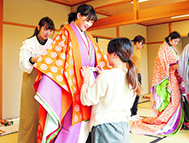日本の大学、大学院留学情報JPSS > 東京都大学のタブから留学先を探す > Gakushuin Women's College > Intercultural Studies
Gakushuin Women's Collegeへの留学をご検討されている方へ。JAPAN STUDY SUPPORTは、公益財団法人アジア学生文化協会と株式会社ベネッセコーポレーションが共同運営している外国人留学生向け日本留学情報サイトです。Gakushuin Women's CollegeのIntercultural Studies学部等、学部別の詳細情報も掲載していますので、Gakushuin Women's Collegeに関する留学情報をお探しの方は是非ご利用下さい。その他、外国人留学生募集をしている約1,300校の大学・大学院・短大・専門学校情報も掲載しています。
東京都 / 私立

In the Department of International Cultural Exchange students will learn about Japan and other countries as they deepen their international understanding. The Department endeavors to produce female leaders capable of working both in Japan and around the globe, in an ever-increasing globalized era.

Putting on a Japanese kimono in the Yuusoku Kojitsu class (that teaches students traditional Japanese customs)
1. Extensive learning from a cultural perspective.
This department offers a rich curriculum that investigates art and thought, folklore and history, and contemporary society from various angles and allows students to gain an understanding of the traditions and history of Japanese culture.
Students can undertake meaningful study according to their personal interests.
2. Develop an understanding of Japanese culture through both practice and theory.
Students will have the chance to gain practical training in traditional Japanese cultural activities such as tea ceremony, flower arrangement, Japanese calligraphy, incense appreciation, and yusoku-kojitsu (traditional court rules of ceremony and etiquette) in general education classes.
Meanwhile, lecture subjects are offered in specialized classes to allow for theoretical understanding.
Our university’s distinctive curriculum aims to build a deep understanding of traditional culture through both practical and theoretical study.
3. Cultivating strong communication skills.
As interest in Japanese culture continues to spread throughout the world, we work to cultivate strong communication skills in our students so that they will have the necessary linguistic proficiency and information processing capabilities to share information about the characteristics of Japanese culture with the rest of the world.
The chance to study alongside many talented international students in a fulfilling learning environment is also an appealing feature of our university.
4. The freedom to study across departmental boundaries.
As well as taking specialized classes offered in the Department of Japanese Studies, students can also take general education classes and classes from other department’s specialized classes that meet their personal interests.
Studying across a wider range in this way will broaden the future possibilities for our students.
From third year, the program is divided into the following four courses:
Folklore and History Course, Japanese Language and Literature Course, Art Culture and Art Management Course, and Contemporary Culture Course.
1. Increasing communication through intercultural understanding.
In order to realize a better international society, it is imperative that we have an understanding of other cultures.
To this end, students in this department will learn about various cultures of different regions in the world by looking at both the past and the present.
2. Understanding global society from a multifaceted perspective.
In order to understand global society, students investigate how countries coexist by studying a wide range of topics including politics, economics, business, law, development, environment, and the media.
3. By undertaking a wide range of study, students will find the topic that they truly want to investigate.
As interest in Japanese culture continues to spread throughout the world, we work to cultivate strong communication skills in our students so that they will have the necessary linguistic proficiency and information processing capabilities to share information about the characteristics of Japanese culture with the rest of the world.
The chance to study alongside many talented international students in a fulfilling learning environment is also an appealing feature of our university.
4. The freedom to study across departmental boundaries.
As well as taking specialized classes offered in the Department of Intercultural Communication, students can also take specialized classes from other departments and other universities that meet their personal interests.
For example, undertaking a deeper study of Japanese culture, and gaining the ability to share this understanding with the global society, will broaden the future possibilities for our students.
From third year, the program is divided into the following four courses:
International Relations Course, Regional Cultures Course, Cultures of the English-speaking World Course, and General English Course.